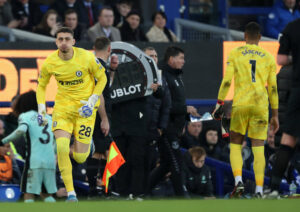Amid the increasing sense that Arsène Wenger is finally reaching the end of his long reign at Arsenal, it is not only Wenger himself who has come in for fierce criticism from the club’s fans but the club’s owner, Stan Kroenke, famously known as “Silent Stan” for his apparent lack of involvement, or even interest, in the affairs of the club. But beyond the immediate difficulties at the Emirates Stadium, the bigger question to be asked is when exactly did club “chairmen” become club “owners”? And it is not just a question of semantics, as it goes to the heart of the growing dissatisfaction among many football fans at the direction the game is taking, not only in England but in the whole of Europe.
For most of English football history, football clubs, even the biggest and most successful, were largely run by local businessmen, who combined a keen interest in the game with a desire to make their mark in their local community. Before football clubs went public in the Premier League era, they were literally “family businesses”, with control handed down from father to son and only after the son had spent a long time learning how to run the family business.
These men may have owned the clubs that they controlled, but they rarely, if ever, referred to themselves as “owners”. Instead, they invariably called themselves “chairmen”. They usually saw themselves as custodians or trustees of the club, which was thought to belong ultimately to the local community, at least emotionally and spiritually, if not in cold, hard economic terms.
Of course, it was with the advent of the Premier League era, when English football went truly global for the first time that this strong bond between a club and the local community in which it was based began to fray and eventually unravel. As the biggest English clubs became self-styled “mega-clubs” with fans all over the world, contributing to the club in TV subscriptions and replica shirts if not in admission prices, so they began to attract the interest of overseas businessmen, to the extent that the majority of Premier League clubs are now foreign-owned.
Roman Abramovich is the classic example, taking over Chelsea when they were on the brink of bankruptcy and turning them, through sheer force of will and billions of petro-roubles, into a European superpower. The fact that they are now on the verge of winning a fifth Premier League title in 13 years under a third different manager is surely all the proof that is needed that it is Abramovich himself and not José Mourinho, let alone any actual player on the pitch, who has been the dominant force at Stamford Bridge over the last decade or so.
Such has been Abramovich’s success in transforming Chelsea from English football’s perpetual also-rans, which they were for most of their pre-Abramovich history, to the most successful English club of the last decade that fans of other clubs have ended up becoming jealous of him, having initially dismissed him as a foreign tycoon who would soon lose interest in the club that he had bought. The irony is that Abramovich is unlike most of the new breed of club owners in being apparently besotted by the beautiful game, seeing football success as an end in itself and not merely a means to an end.
Abramovich is present at Stamford Bridge for almost every home game, in complete contrast with the likes of Kroenke at Arsenal, Sheikh Mansoor at Manchester City or John Henry at Liverpool. Moreover, Chelsea are his only real sporting concern, unlike Kroenke, who has a whole portfolio of under-performing US sporting franchises, or Henry’s Fenway Sports Group, whose principal interest is in baseball.
At Manchester City, Sheikh Mansoor may not own other major sporting outfits—with the exception of the network of City-affiliated feeder clubs being created around the world—but even he may have an ulterior motive in buying City and trying to propel them to Premier League and Champions League success. As Matthew Syed, the brilliant sporting columnist for The Times, has written on at length in a series of articles, ultimately Mansoor and his family may be more interested in the “soft power” and cultural influence they acquire through Manchester City than in the club itself.
Thus we have arrived at a unique point in English and European football history, where the increasing globalisation of the game has attracted a new breed of billionaire who may be more interested in what the game can do for them than what they can do for their local club in particular and the game in general. Certainly, that is the suspicion among many Arsenal fans, who fear that Kroenke’s only real interest in Arsenal is in using it as a cash-cow, using its many millions in the bank to borrow against while funding his overwhelming sporting interest, which is turning the LA Rams American football team into a genuine power in the NFL.
If that is indeed Kroenke’s agenda, then it is further proof that football’s new “owners” have far less in common with the average football fan than the traditional “chairmen” who ran football clubs. For all the billions that the likes of Kroenke possess, that money is of no use to the clubs they own if they do not use it in the club’s own best interests, and instead use the fame that owning a club brings to further their own personal and political ambitions.
Main Photo






